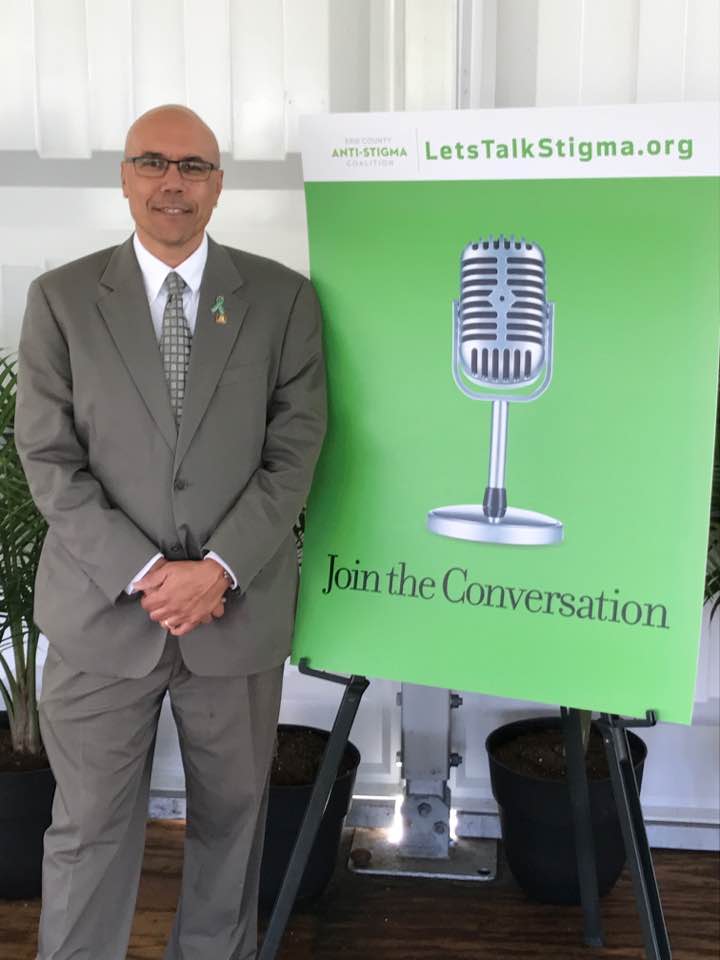BipolarBrave: Karl, tell me a little about yourself and how you discovered you had bipolar.
Karl: I’m a Western New York Native and I work for the Mental Health Association of Erie County and Compeer Buffalo. I’m a New York State Credentialed Alcoholism and Substance Abuse Counselor. I’m also a Certified Mental Health First Aid Instructor. I’ve been married for 22 years and have two daughters.
I had a major psychotic episode at the age of 18 while I was a freshman in college. I cycled in and out of mental hospitals for eight years until I stabilized my condition. I’m in long-term recovery from addiction and this was a key part of my recovery from my bipolar disorder.
BipolarBrave: What is your current position at Compeer and what does a typical workday look like?
Karl: I am the Director of Community Advocacy at the Mental Health Association of Erie County and Compeer Buffalo. I’ve been there for over three years. I coordinate our Mental Health First Aid program. We have 10 instructors and have trained nearly 1600 people in the last three years. I am the Project Director for a federal SAMHSA (Substance Abuse and Mental Health Services Administration) grant called Project AWARE. This initiative is designed to train individual in Mental Health First Aid that are faculty, staff and students at Erie Community College. I also oversee the MHA’s Mindset program which is a workplace wellness for businesses and organizations to help them have a more psychologically healthy workplace.
No two days are the same which is one thing I enjoy. I’m typically involved in multiple projects and am on several Boards so much of my time both in and out of work is tied into mental health.
BipolarBrave: How are you helping eradicate the stigma associated with mental illness and addictions?
Karl: I’m part of a coalition of 15 organizations that just launched a program called, “Start the Conversation.” (www.LetsTalkStigma.org). This is an initiative that is currently in Erie County and is intended to help people understand that it’s okay to discuss mental health and that by doing so we, as a community, can be healthier . This project took nearly two years to come to fruition.
As I previously mentioned, I am a Mental Health First Aid Instructor which helps to educate people about the facts surrounding mental illness.
I also serve on the Mental Health Association in New York State (MHANYS) Board of Directors. MHANYS is the parent organization for all of the Mental Health Association affiliates in New York State, We work on a number of levels including public policy and community education.
I’ve been a contributing writer and blogged for BP magazine as well as having my own blog, The Hope Shot (www.thehopeshot.com) that focuses on mental health and addiction from a spiritual perspective.
BipolarBrave: What was harder to tame, the bipolar symptoms or the addictions?
Karl: They kind of go hand in hand. But when I stopped using, my mental health substantially improved.
BipolarBrave: Where are they entwined? Does one pick up where the other left off? How did you surpass their grip?
Karl: I think much of the interrelation around co-occurring disorders lies in one’s brain chemistry. People who live with these conditions typically have some kind of difference in the structure of the brain as well as how it relates to thinking and behavior. That’s where Cognitive Behavioral Therapy (CBT) can be effective. It helps one to examine his/her thoughts and how they relate to their feelings and subsequent behaviors. Also, for many, medication can be a good adjunct to psychotherapy. Research has shown that the combination of the two can be very effective.
BipolarBrave: Now that you have control over your symptoms, what do you have to do each day to maintain mental wellness?
Karl: I take medication, I have a regular sleeping pattern and I exercise. I also try to meditate (which can be challenging considering my bipolar brain)..
BipolarBrave: Who is your biggest inspiration?
Karl: Jesus. HIs example of caring for the downtrodden and vulnerable people of his time is something I try to emulate. He is the embodiment of empathy and compassion. He accepts EVERYONE despite their differences. Jesus has been with me through my entire recovery journey.
BipolarBrave: What is something you like to do on vacation?
Karl: I love going to the beach. My favorite vacation spot is Cape Cod. I went there on my honeymoon and have been there many times since. I love the vibe and laid back atmosphere. It is also full of great memories with my wife and girls.
BipolarBrave: Can you give someone struggling with their fear of association to either bipolar disorder or addictions a word of encouragement?
Karl: First I would say, “Never give up.” I was so far down that at one time I was in a hopeless state. But perseverance and hard work pay off. I had to accept my condition but never let it control me. It can be a very scary thing to get this diagnosis but it’s not a death sentence. People do recover from bipolar disorder. Patience is important. Recovery doesn’t happen overnight but if you use the proper tools then you can get better. Also, if you find something that is working for you then stick with it. It’s easy to get complacent or think that you’re “cured” however it is important to know that there are some things that need to be done to maintain your recovery.
For more information, Karl Shallowhorn keeps a blog at www.thehopeshot.com.


What do you think?